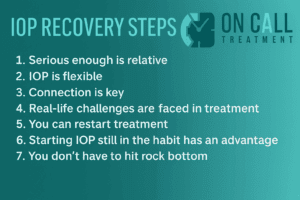It’s a question many people carry in silence—but type into search bars late at night: “Do I have to be sober before I start treatment?”
For someone who’s used to functioning at a high level while drinking or using, this question can feel loaded. You might picture treatment as a cold room with a clipboard, someone asking if you’ve been “completely clean,” and the sinking feeling that your answer disqualifies you.
The reality is far more open. At On Call Treatment’s intensive outpatient program in Waltham, MA, we meet people where they are. That includes those who aren’t fully sober yet. Because here’s the truth: the longer you wait for the “perfect time” to start, the harder it can be to take that first step at all.
Sobriety Isn’t Always the Starting Point
In movies and in some people’s minds, recovery begins with a dramatic moment—you pour the bottles down the drain, throw out the pills, and walk into treatment stone-cold sober. In real life, it often doesn’t happen like that.
Many people enter an intensive outpatient program (IOP) still drinking or using to some degree. That’s not a sign of weakness—it’s a reflection of how substance use disorder works. Stopping on your own, without tools or support, can feel impossible.
An intensive outpatient program in Waltham, MA is designed to give you that support. You can begin building coping strategies, exploring your patterns, and learning to navigate cravings while you’re still in the process of becoming sober. In fact, for some, the structure of IOP is what makes full sobriety achievable.
Understanding Safety and Medical Needs
There is one important caveat—safety. If you’re physically dependent on alcohol, benzodiazepines, or certain other drugs, quitting suddenly can be dangerous, even life-threatening. Withdrawal from these substances may require a short-term medical detox before starting IOP.
This isn’t about creating an extra hurdle. It’s about making sure your body is stable enough to participate in therapy and group work without medical risk. Think of it like prepping for surgery—you wouldn’t go in while fighting a severe infection. Detox is simply preparation, not a judgment or a punishment.
Once you’ve stabilized, you can move directly into IOP, often within days. You won’t lose momentum—in fact, you’ll be better equipped to make use of the program.
Treatment Is More Than Stopping
If you’ve been high-functioning while using, you may have told yourself: “If I could just quit, everything else would fall into place.” But recovery is rarely that simple.
An intensive outpatient program doesn’t focus solely on stopping the substance. It addresses the deeper “why” underneath it, helping you:
- Recognize the stressors, relationships, or beliefs that fuel your use
- Learn practical coping skills that actually fit your lifestyle
- Repair trust and set boundaries in ways that stick
- Develop new ways to decompress, connect, and reset without substances
This means you can begin making progress even if you’re not fully sober yet. Sometimes, it’s the emotional and behavioral changes you make in treatment that create the foundation for sustained sobriety.

High-Functioning Doesn’t Mean Low-Risk
Holding a job. Paying the mortgage. Being presentable in public. These are often seen as markers that a drinking or drug habit isn’t “that bad.” But high-functioning doesn’t mean safe.
It just means you’ve learned how to work around the damage. Maybe you keep the drinking to evenings. Maybe you never use before a big meeting. Maybe you’ve trained yourself to push through hangovers like they’re just another workday.
But the risks are still there—physical health decline, emotional burnout, isolation, and the creeping erosion of your confidence and self-respect. You don’t have to wait until you’re missing deadlines, losing relationships, or facing health crises to get help.
Honesty Is the Real Entry Criteria
When you start IOP, we’ll ask about your substance use. Not to shame you—but to make sure the program is tailored to your needs.
If you’re honest, we can help you create a plan that works for your exact starting point. That might mean starting with harm reduction strategies before full abstinence. It might mean layering in medical support if needed. The point is, you won’t be excluded just because you’re not yet sober.
Walking in with a perfect track record isn’t required. Walking in ready to be truthful is.
The Advantage of Starting While You’re Still in the Habit
It might sound counterintuitive, but beginning IOP while you’re still drinking or using in some capacity can offer a unique benefit: you can apply the skills you’re learning in real time.
For example, if you talk in group on Monday about setting boundaries with certain friends, you might have a chance to practice that boundary later in the week—and then come back and process it. This immediate feedback loop can accelerate your growth.
With inpatient, you might not encounter those real-world triggers until after discharge. With IOP, you can work through them as they happen, supported by your therapist and group peers.
You Don’t Have to Hit Rock Bottom
The myth of rock bottom is one of the most damaging ideas in recovery culture. Waiting for everything to collapse before you seek help is like waiting for a car engine to seize before getting it serviced.
You can choose to start IOP before the crisis point. Before the DUI. Before the divorce papers. Before the health scare. The sooner you step in, the more of your life you keep intact.
Call (833)287-7223 to learn more about our IOP services in Waltham, MA.
Frequently Asked Questions About Intensive Outpatient Programs
1. What is an Intensive Outpatient Program (IOP)?
An IOP is a structured treatment option that includes multiple therapy sessions per week—often group therapy, individual counseling, and educational workshops—without requiring you to stay overnight.
2. Do I need to be completely sober before starting IOP?
Not always. If you’re not physically dependent on substances that require detox, you can often begin IOP while still working toward sobriety.
3. What if I need detox before IOP?
If withdrawal could be dangerous, a short-term medical detox is recommended first. After that, you can usually transition directly into IOP.
4. Is IOP effective for high-functioning individuals?
Yes. IOP allows you to maintain work, school, or family commitments while receiving intensive therapeutic support. It’s especially effective for applying skills in real-world settings.
5. How honest should I be about my current use?
As honest as possible. Your treatment team isn’t there to judge you—they’re there to help you build a plan that fits your reality.
6. What happens if I relapse during IOP?
Relapse doesn’t mean you’re out. It’s addressed in the program as part of the recovery process, and your care plan will be adjusted to help you get back on track.
7. How long does IOP last?
Programs vary, but many last 8–12 weeks, with the option to extend or step down to less intensive care as you progress.
8. How do I know if IOP is right for me?
If you need structured support but don’t require 24/7 supervision, and if you want to work on recovery while staying connected to your daily life, IOP may be a good fit.

